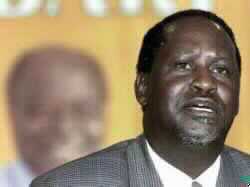Kenya's opposition appeared on course for a landmark victory on Saturday as unofficial results trickled in from general elections marking the end of President Daniel arap Moi's 24-year rule. If the trend continues, Kenya could record one of the most remarkable democratic changes in Africa by peacefully retiring one of the continent's last old-style political strongmen.
"We are cruising to a fantastic and historic victory," leading opposition politician Kijana Wamalwa said as early returns appeared in line with most analyst predictions.
"The mood here is very somber," said an official at State House, seat of power in east Africa's largest economy.
Exploiting a thirst for change after years of economic decline and corruption, the opposition National Rainbow Coalition (NARC) is tipped to overturn almost four decades of dominance by the ruling KANU party.
The focus is on the race for the powerful presidency. NARC leader Mwai Kibaki is vying with Uhuru Kenyatta, the son of Kenya's first president and candidate of the Kenya African National Union. Three minor candidates are given little chance.
Kibaki, tipped as favorite by many pundits, led with 69 percent of the presidential vote against 28 for Kenyatta with 1,044,667 votes counted -- just under a tenth of those registered -- according to figures from the Institute for Education in Democracy, a non-governmental organization.
NARC has won 36 seats against 12 for KANU in the race for the largely toothless assembly, according to unofficial results compiled by the IED and private Nation Television. Parliament has 210 elected members and 12 nominated by the parties.
The Commonwealth congratulated Kenya for holding what it called responsible and orderly elections and showing faith in democratic values. It appealed to all parties to accept the results and act with statesmanship.
Senior NARC official Raila Odinga, whose Luo tribe is a key component of NARC, told reporters he expected Moi to hand over power peacefully to protect his legacy and secure his future.
Moi on Saturday shrugged off the prospect of poll humiliation for his anointed successor, telling reporters at an army farewell parade: "Well, that is the way democracy goes. I had said whoever wins, I will hand over power."
FURTHER BLOW TO KANU
In another blow to KANU, election officials said Vice President Musalia Mudavadi lost his seat, as did KANU's top politician in the Indian Ocean region, Shariff Nassir.
Voting went mostly peacefully but two people were killed in western Kisii district on Friday evening when a policeman accompanying a car carrying ballot papers to the main counting center opened fire on another car, mistakenly fearing an ambush.
The car he shot at was also ferrying ballots but had become stuck. A polling agent and his assistant were killed.
Downpours hit voting by disrupting transport in a handful of constituencies where voting was taking place on Saturday.
The national mood appeared mostly calm and upbeat despite widespread complaints from individuals who were barred from casting ballots after finding themselves left off voter lists.
"We are happy and excited, even though we are tired, we won't even sleep," said Greta Awour, a polling clerk at a station in Nairobi where exhausted officials slumped over desks.
Moi, 78, is bound by the constitution to step down.
NARC appeared to be consolidating its lead. The IED said Kibaki had won over 50 percent of the votes cast so far in six provinces, putting him on course to satisfy the requirement that a winning presidential candidate win nationally and get at least a quarter of votes cast in at least five of the eight provinces.
There was some consolation for Kenyatta in the form of victory in his Gatundu South constituency -- the first time he has ever been elected to any office. His opponent, Moses Muihia, conceded defeat in a telephone conversation with Reuters.
KEY TEST OF DEMOCRACY
The Electoral Commission has yet to issue results, and says the official presidency result might not be out until January 1.
The polls are seen as a key test of Kenya's democracy, marking the country's first experience of a president bowing out in favor of a successor in the nation of 30 million.
KANU has ruled since independence from Britain in 1963, but the party is facing its toughest election challenge yet from NARC, which has buried a decade of opposition disunity.
Kibaki, 71, has pledged to revive the economy, although critics question how much change he can deliver, pointing to numerous recent KANU defectors in his party.
Kenyatta, 30 year's Kibaki's junior, has campaigned on his relative youth, playing down his lack of experience in office and battling a perception that Moi may seek to control him.
PHOTO CAPTION
Raila Odinga, senior official in the main opposition party National Rainbow Coalition, addresses a news conference in Nairobi December 28, 2002. Kenya's opposition scored early successes Saturday as unofficial results trickled in from general elections marking the end of President Daniel arap Moi's 24-year rule. NARC leader Mwai Kibaki is vying with Uhuru Kenyatta, the son of Kenya's first president and candidate of the Kenya African National Union. Kibaki, tipped as favorite by many pundits, led with 72 percent of the presidential vote against 25 for Kenyatta with 41,453 votes counted, according to figures from the Institute for Education in Democracy, a non-governmental organization. (Juda Ngwenya/Reuters)
- Author:
& News Agencies - Section:
WORLD HEADLINES


 Home
Home Discover Islam
Discover Islam Quran Recitations
Quran Recitations Lectures
Lectures
 Fatwa
Fatwa Articles
Articles Fiqh
Fiqh E-Books
E-Books Boys & Girls
Boys & Girls  Hajj Rulings
Hajj Rulings Hajj Fatwas
Hajj Fatwas














